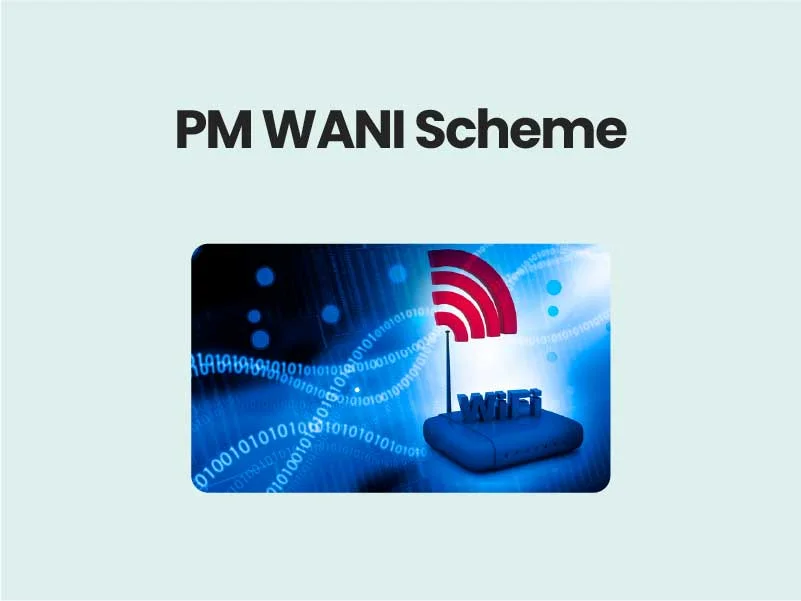
PM WANI Scheme
PM WANI Scheme – The Union Cabinet chaired by the Prime Minister, Shri Narendra Modi has given its approval for the proposal of DoT for setting up of Public Wi-Fi Networks by Public Data Office Aggregators (PDOAs) to provide public Wi-Fi service through Public Data Offices (PDOs) spread across length and breadth of the country to accelerate the proliferation of Broadband Internet services through Public Wi-Fi network in the country.
- There shall be no license fee for providing Broadband Internet through these public Wi-Fi networks.
- The proposal will promote the growth of Public Wi-Fi Networks in the country and, in turn, will help in proliferation of Broadband Internet, enhancement of income and employment and empowerment of people.
Salient Features of PM WANI Scheme
- This Public Wi-Fi Access Network Interface will be known as PM-WANI.PM-WANI eco-system will be operated by different players as described herein under:
- Public Data Office (PDO): It will establish, maintain, and operate only WANI compliant Wi-Fi Access Points and deliver broadband services to subscribers.
- Public Data Office Aggregator (PDOA): It will be an aggregator of PDOs and perform the functions relating to Authorization and Accounting.
- App Provider: It will develop an App to register users and discover WANI compliant Wi-Fi hotspots in the nearby area and display the same within the App for accessing the internet service.
- Central Registry: It will maintain the details of App Providers, PDOAs, and PDOs. To begin with, the Central Registry will be maintained by C-DoT.
Udyamimitra Portal
Objectives:
- While no registration would be required for PDOs, PDOAs and App Providers will get themselves registered with DoT through online registration portal (SARALSANCHAR; https://saralsanchar.gov.in of DoT, without paying any registration fee. Registration shall be granted within 7 days of the application.
- This is expected to be more business friendly and in line with efforts for ease of doing business.
- COVID-19 pandemic has necessitated delivery of stable and high speed Broadband Internet (data) services to an increasingly large number of subscribers in the country including areas which do not have 4G mobile coverage. This can be achieved by deployment of Public Wi-Fi.
- Further, the proliferation of public Wi-Fi will not only create employment but also enhance disposable incomes in the hands of small and medium entrepreneurs and boost the GDP of the country.
- Proliferation of Broadband Services through public Wi-Fi is a step towards digital India and consequential benefit thereon.
- No License Fee for providing broadband internet services using public Wi-Fi Hotspots will massively encourage its proliferation and penetration across the length and breadth of the country.
- Availability and use of Broadband will enhance incomes, employment, quality of life, ease of doing business etc.
Benefits
- It opens up opportunities for community organisations, libraries, educational institutions, panchayats and small entrepreneurs to tap into a whole new ecosystem, purchasing bandwidth from a public data office aggregator to serve local consumers.
- The WANI system offers an elegant way forward to connect low revenue consumers.
- Boosts GDP
- Ease of doing business
- Enhances Quality of life
- Financial Inclusion
FAME India Scheme
Challenges
- slow network speed
- Security Risks
- As per TRAI in 2019, India now has among the cheapest mobile data per GB in the world, with mobile data prices having reduced by 95% in the last five years.
- Clash with Mobile Telecom Firms
Conclusion
Executed properly, the public data offices (PDOs) of PM WANI can do what the PCOs did for phone calls, going well beyond ‘ease of doing business’ to genuinely empower citizens.
- Must ensure true unbundling of hardware, software, apps and payment gateways in the WANI system, as advocated by TRAI, to prevent monopolies.
- Strong cyber security needed: PM WANI should ensure the public data is protected and safe. In this context, the enactment of the public data protection bill, 2019, is the need of the hour.

